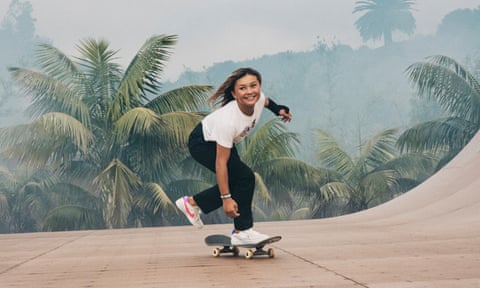The sun is setting on another hazy summer evening in Oceanside, California, a city 35 miles north of San Diego, and a tiny figure is flying through the sky. She bends her knees, clutches the end of her skateboard and comes gliding down an enormous ramp, her sun-bleached surfer hair bouncing in the wind.
“That was sick!” Sky Brown shouts, as she makes an immaculate landing. The skateboarder is ranked third in the world and on 4 August will take to her board to represent Team GB at the postponed Tokyo Olympics. When she competes in the women’s park event, she won’t just be one of the UK’s first ever Olympic skateboarders, she will also be Team GB’s youngest ever summer Olympian. Aged 13 years and 23 days, she will surpass Margery Hinton, who was 13 years and 44 days when she swam at Amsterdam in 1928.
As Brown takes off again, everyone on the ground – including her dad, Stuart, and some local skate fans – looks up in awe. She seems unaware that all eyes are on her. The fearless teenager, who skateboarding legend Tony Hawk last year described as a “unicorn” and “one of the best female skaters ever, if not one of the best well-rounded skaters ever, regardless of gender”, has been drawing crowds since she was eight.
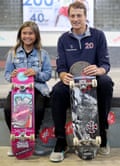
It’s only when she shouts “Daddy!” in a high-pitched voice, wrapping her arms around her father and talking to him in Japanese (her first language; she was born in Miyazaki, Japan, to her British father and Japanese mother, Mieko), that I’m reminded of how young Britain’s brightest hope in one of the Olympics’ newest sports actually is.
Brown has jumped over two major hurdles to get to Tokyo. First – and this, if nothing else, she has in common with other 13-year-olds – she had to persuade her parents, who weren’t initially sold on the idea. Second, she suffered a life-threatening crash while skating last spring. Had the Olympics gone ahead in 2020, it is unlikely she would have recovered in time.
“My parents thought it would be too much pressure, so we weren’t going to do it,” Brown says. She has a brother, Ocean, nine, also a promising skater, and the family now divide their time between Japan and California for skating events. Brown could have represented Japan or Britain. But Team GB said: “‘Come be on our team, there’s no pressure, just get out there and have fun,’” she says. “That made my parents feel a little better. But I begged and begged... ”
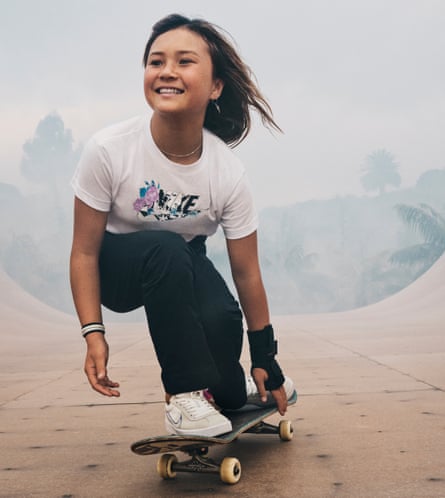
There is no “momager” at work here; no stage parents pulling the strings or piling on the pressure. In fact Stuart, who works in marketing and skates as a hobby, says he figured that “if it didn’t go well, we could quit at any time”.
Brown was only 10 when the first Olympics qualifier came around in Long Beach, California, in 2019. Just a week before the event, she fell off her board. It was a fairly minor accident, but she was left with a broken arm. “We were like, ‘Ah, you’re done. That’s over with then,’” Stuart recalls. “And she said, ‘No, I can still skate with my arm in a cast’ and she did – a broken arm in a pink cast.” Not only did Brown skate on: she came first.
Brown’s parents supported her decision; but the next time wouldn’t be so easy. In May last year, Brown fell head first from a 4.5 metre ramp. She suffered multiple fractures to her skull, a broken left arm and hand, and lacerations to her heart and lungs. “I mean, I was just skating, like every day, and then I was knocked out. I don’t remember anything about the fall,” she says, “but apparently when I woke up, I didn’t know who I was or who my family were.”
Still, she was back on the board in just two months. “It actually made me more excited and more pumped up. It made me want to go harder,” she says. For her parents, it was more complex. “For myself and my wife, and even Ocean, I think it was more traumatic than it was for Sky, because she doesn’t remember it,” Stuart says. “It was really hard for my wife. It took a long time before she could see Sky skate again. She doesn’t really watch her any more. She’ll watch videos afterwards but not live.”
“My parents didn’t want me to skate for so long,” Brown sighs. “But I just felt like I couldn’t stop skateboarding. I just told them I need to skate. It’s one of my favourite things to do. You only get one life and you’ve got to enjoy it.”
When it comes to competing, Brown has a noticeably relaxed approach, as you might expect from someone who spends half their life in California. “I’m not nervous,” she says of Tokyo 2020, “I’m just excited to show the world what skateboarding is really like.” It isn’t something she’s been dreaming about her entire life: “I was just skating and having fun. I wasn’t trying to be good or a pro. I was just trying to learn new tricks. I didn’t really think skateboarding was going to be in the Olympics,” she admits. And she’s probably not alone there.
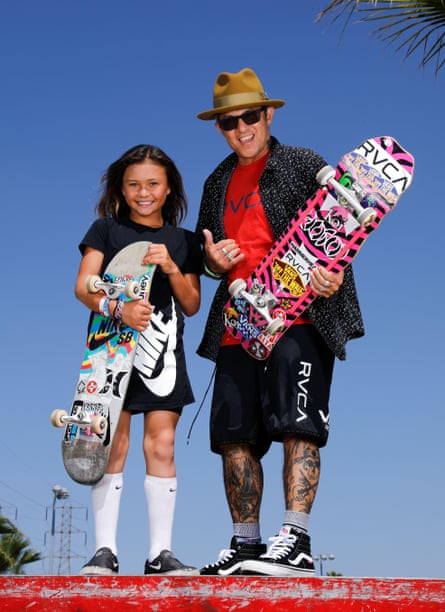
Skateboarding was one of four sports added to the Olympics for the first time in 2016, alongside surfing, climbing and karate (baseball and softball return for the first time since 2008). Skateboarding’s debut this summer has been a long time coming. “In my eyes, we should have been in the Olympics back in the 1980s,” says Christian Hosoi, a pro skater and founder of Hosoi Skateboards. Hosoi is a skating friend of Brown’s who turned pro at 14 and still skates in his 50s. (“Every time I see him at a skatepark, he helps me and is like, ‘Maybe do this higher, tweak this a little more,’” Brown beams. “He’s a legend.”)
“At that stage in the evolution of skateboarding [the 80s], we were still trying to find the heart and soul of what we do on a stage,” Hosoi says. “The Olympics wasn’t ready to handle the lifestyle of a skateboarder at that time. We were rough around the edges.”
But how do you turn a street sport into a competitive sport? In the park skate event, Brown will have three 45-second runs (each run might feature eight to 10 tricks) and her best run will count. In the street event (on a straighter course), competitors will each have two 45-second runs but get five attempts at their best trick, so that their four best scores out of seven will count.
“The runs are completely put together by the skaters,” explains Lucy Adams, progression project lead at Skateboard GB. “It’s not like diving, where you pick a dive that exists and tell the judges that’s the dive you’re going to do. You make your own journey and put it together as you see fit. The judging will look at technical aspects such as use of the course, how you put the run together, what tricks you pick, consistency, style and speed.”
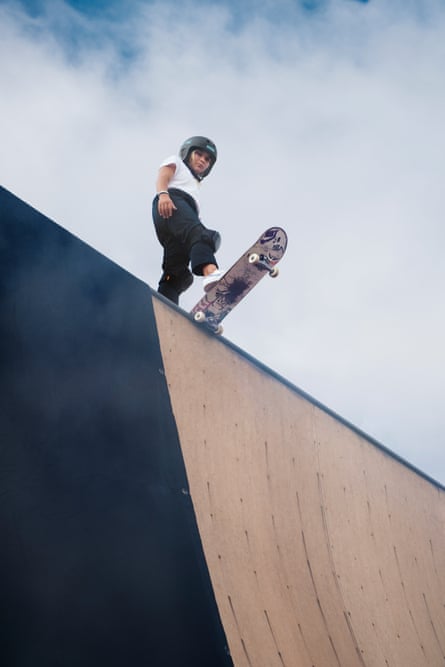
Adams, a pro skater herself, who helped assemble the British team, hopes that having skateboarders competing in the Olympics will push back against perceptions that skateboarding is a slightly punkish sport and will give “an awareness of how hard-working and dedicated we are”. Brown’s sole skateboarding teammate on Team GB will be Bombette Martin, a veteran in comparison, at 14. Martin is also based in the US, in New York. That the only members of the team are both teenage girls highlights how an alternative sport once seen as intimidating and antisocial has become more diverse and inclusive. “If you go to a skatepark now, you’ll see someone from every age and background,” Adams says. “And we have seen a sharp rise in female participation in the past couple of years. Shops have reported selling helmets and pads to more women than ever before.” Unlike some other Olympic sports such as gymnastics, skateboarding has no minimum age, which is why prodigies such as Brown are able to compete against grown women.
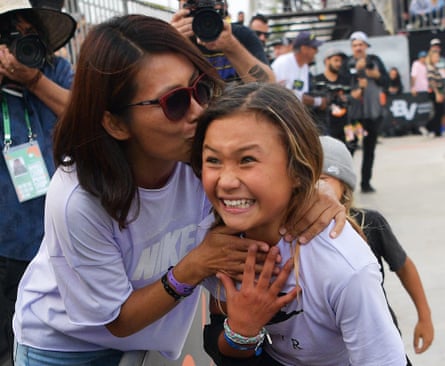
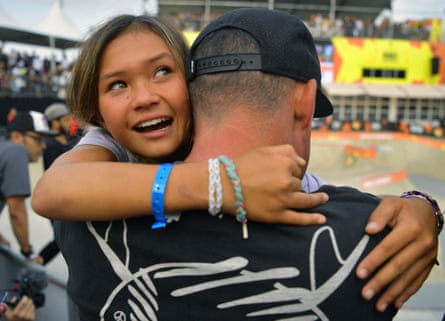
Adams will never forget the first time she met Brown. It was at a competition in Bristol in 2017 at which they were both competing. Adams came third; Brown, then nine, came second. By the time Brown was 11, she was the first female skateboarder in the history of The X Games (the annual extreme sports event) to land a frontside 540, throwing her tiny 1.35m (4ft 5in) frame into one and a half rotations on her board in midair. Later in 2019 she won a bronze medal at the World Championship in São Paulo which consolidated her third position in the world rankings.
“She just has a style,” Adams says, scrambling to find the right words to describe how Brown rides. “It’s quite surfy but so strong and powerful for someone who is small and weighs nothing.”As well as picking up tricks from famous skateboarders such as Hosoi, Brown has spent years studying moves on YouTube and watching the other girls in her “crew” who include fellow Olympians Sakura Yosozumi, 19 (representing Japan in park), Leticia Bufoni, 28 (representing Brazil in street) and Rayssa Leal, 13 (also Brazil in street). Brown and Leal are best friends and have travelled the world together. “It’s nice because I feel like we motivate each other to go hard,” Brown says.
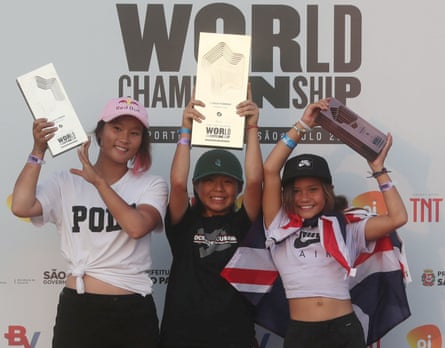
She’s never had a coach. This is the norm, and very much a part of the culture of skateboarding, Adams says. Do they even call it training? “No, we call it, ‘Going skating!’” she laughs. “Why change something that is working? Sky’s lifestyle and how she fits surfing and skating into her daily life, with the people she likes, is what makes her who she is and how good she is.”
When the Browns are in California, Sky wakes up every morning at 5am to go surfing near their home. “I think surfing helps with my skating – it’s pretty similar – so if the waves are good, I will surf for three to four hours,” she says.
After a breakfast of kimchi and fermented soya beans, she does schoolwork. History is her favourite subject. She attends a charter school in Orange County two days a week and completes the remainder online to allow for travelling. After school, she’ll skateboard for up to three hours and often at different skateparks (she favours Prince Park in Oceanside or Poods in nearby Encinitas).
Bombette Martin, who lives in New York with her American mother, Mary, and British father, Jon, has a similar philosophy to Brown. “Honestly, my everyday coach is my little brother, Kayo, who is 11 and a phenomenal up-and-coming skateboarder,” she tells me over the phone from her home in Manhattan. “My parents don’t really like it but we are competitive with each other and that helps push us. It’s like, ‘I can do that trick better than you.’ ‘Oh no you can’t, I’m going to do it better than you.’ We have different tricks, so I can take from his bag and he can take from mine.”
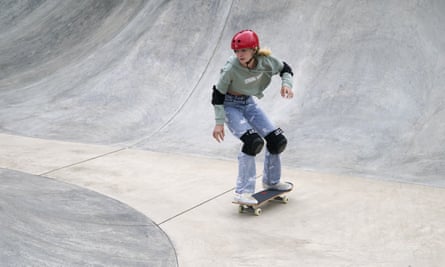
The biggest competitions of her career so far were both Olympic qualifiers (the British National Championships in April and the Dew Tour in May), so Martin, who ranked 18th in qualifying, is under no illusions about the challenge ahead. “Every single park and bowl is made differently, so at the Olympics I’m sure it’s going to be one of the hardest bowls a lot of us have ever skated and we only get a bit of time to practise,” she says. “A lot of people watching aren’t going to realise how difficult it is, but every person has different tricks to put into it, so I think it’ll be really cool to watch.”
Martin has only been skating since she was nine. This is probably why she doesn’t see herself in competition with Brown, who she hopes will take home a medal. Martin is just happy she gets to represent Britain in the Olympics, knowing her father’s side of the family, in Birmingham, will be cheering her on. “I’m so excited. I’m a little nervous but at least I don’t have the pressure to get a medal or anything,” she says. “I just want to go and do my best. Next time, maybe Paris in 2024, I’ll go for a medal. That’s how I’m thinking about it.”

The history of extremely young athletes competing goes back as far as the first modern Olympics. At the Athens games in 1896, 10-year-old Dimitrios Loundras – still the youngest Olympic athlete of all time – took home a bronze medal with his gymnastics team. How teenage Olympians handle the pressure varies. In 1976, 14-year-old Romanian Nadia Comaneci, en route to claiming three golds, was the first gymnast to be awarded a perfect 10 in the Montreal Olympics. Others have found the pressure stifling. Team GB’s Tom Daley made his Olympic debut in Beijing in 2008, aged 14. Having won the European Championships at 13, expectations were high, the attention was suffocating, and he came seventh. He later won a bronze in Rio, and is still competing at 27.
Brown started so early that she can’t even remember her first time on a skateboard. Her dad does. “I remember her, as a baby, on her tummy all the time on a skateboard,” he says. “It sounds like a cliche but it was her favourite toy. She liked riding it around the kitchen.”
In Japan, the whole family would skate everywhere, “as a mode of transport”, and Stuart built a mini ramp in their backyard. He says: “I’d skate there with friends and Sky would always try to skate with us – often unwelcome – and I think that kind of egged her on.”

He shows me videos of Adventure Parc Snowdonia, near Conwy, which has an inland surfing lagoon – one of his favourite places to take the kids surfing when they visit the UK – as Brown skates away in the background. He finds the hype around his daughter very weird. “She’s just a good kid,” he shrugs.
She was four when Stuart realised she had a rare, raw talent. He posted a video on Facebook of her skating. “It got millions of views overnight and I thought, ‘Oh shit!’ It went nuts. That was probably the first time I thought, she’s actually really good for her age.”
Just four years later, Brown convinced her parents to let her compete in her first event – the Vans US Open in 2016 – and she has been competing professionally ever since. She was still relatively unknown when, in 2018, she was approached to star on US reality TV show Dancing With The Stars: Juniors.
“We didn’t even know what the show was,” Stuart says. “My wife and Sky started watching it on an iPad. I went to bed and when I woke up at 3am they were still watching it. Sky turned to me and said, ‘Daddy, can I do this show?’ She ended up turning down The X Games – something she’d always wanted to do – to do Dancing With The Stars.”

Despite having only “danced in front of the mirror” before appearing on the show, Brown and her partner, US teen dancer JT Church, won the whole competition. “It was one of the most fun things I’ve ever done because I’m a girly girl and I got to dance and get my hair and makeup done,” she says. The show brought a new level of fame and a lot of attention, which came as a shock to the then 10-year-old Brown and her parents. “When it finished, Sky was meant to stay in the US to do The Ellen DeGeneres Show and other press but we just took her back to Japan for three months and hid,” Stuart says. “Everything you’re not meant to do, we did.”Still, she’s increasingly prominent on social media. Her YouTube channel, Sky & Ocean (her brother has a growing fanbase, too) – where they post videos of them surfing, skating and going about their (albeit extraordinary) daily life – has had nearly 54m views. She has a lucrative Nike sponsorship (among many others) and appeared in an ad campaign alongside Serena Williams and Simone Biles. She also released a one-off pop single, Girl, while she recovered from her accident last year and has published a book, Sky’s The Limit. Her Instagram has 815k followers (and counting): she manages it herself with some help from her dad.
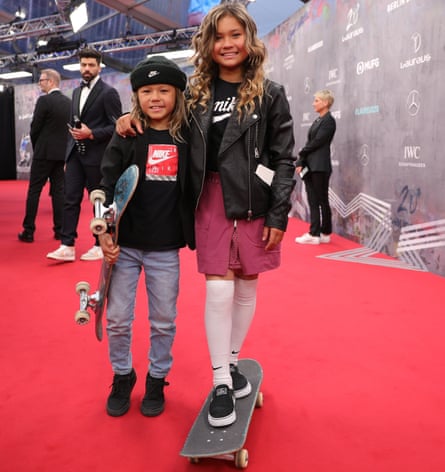
How do her parents feel about her having such a presence online?
“People say she does a lot of Instagramming, but we really limit her social media,” Stuart says. “Her sponsors hate it but it’s something we’ve kept as a family. We often do a month where none of us touch our phones, which our friends hate, too.”
It’s dark when Brown’s skating session, and our interview, draws to a close. She still has a smile on her face. What does the future hold for someone who has achieved so much by the age of 13? “I have so many dreams,” she says, “but my main one now is to go to underprivileged places and teach kids to skate, because I feel like skateboarding – and other sports – helps people who are struggling.” Brown is well aware that she could attract a whole new generation to the sport. “I want to keep on getting better, try to push boundaries and close the gender gap in skateboarding. I hope I can inspire some girls by being the smallest one in there; hopefully, they’ll be like, ‘Oh, I can do it, too!’ That’s why I want to be in the Olympics,” she says. “It would be so cool to get a gold medal. But more than that, I want to inspire people.”
